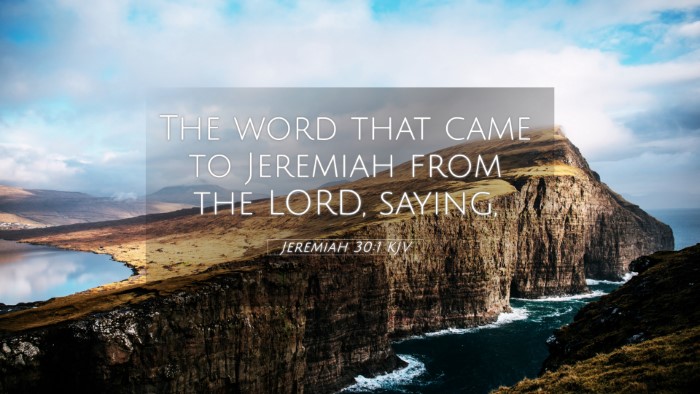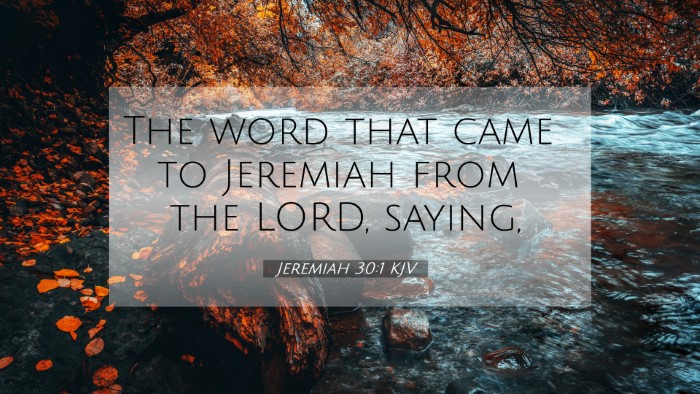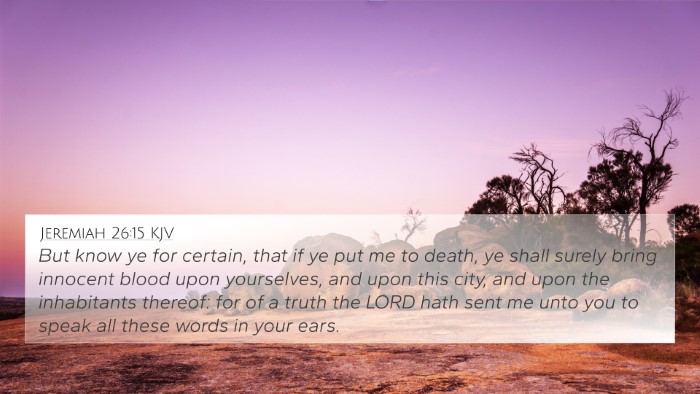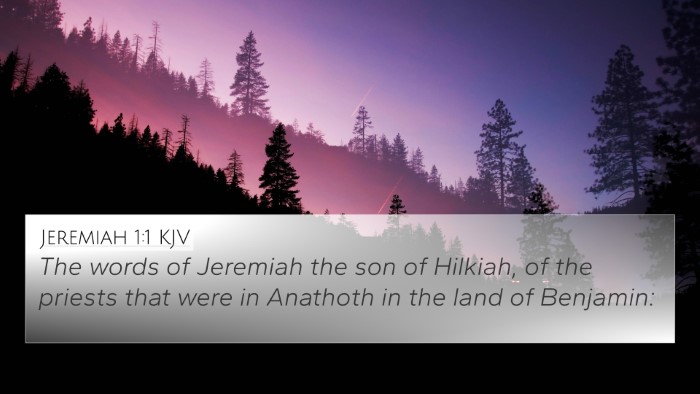Understanding Jeremiah 30:1
Jeremiah 30:1 states, "The word that came to Jeremiah from the LORD, saying," emphasizing the divine source of knowledge that Jeremiah received. This verse serves as an introductory statement for the prophecies that follow in the entire chapter, symbolizing God’s ongoing relationship with His people and the communication of His will.
Commentary Insights
Contextual Overview: This verse begins a section where the prophet Jeremiah communicates a message of hope amid despair for Israel and Judah. It is vital to note the historical context wherein the Israelites were facing impending judgment and exile due to their sins. The promise of restoration illustrates God's grace and ability to redeem His people.
Matthew Henry's Commentary: Henry notes that the phrase "the word that came to Jeremiah" indicates the authority behind the message. It emphasizes that the messages are not Jeremiah's own but divinely inspired revelations. This can lead the faithful into deeper trust that God speaks to His people through His prophets.
Albert Barnes' Notes: Barnes expounds that this particular prophecy initiates the “Book of Comfort,” reflecting on the forthcoming restoration of Israel. The Lord reveals His unchanging covenant despite Israel’s unfaithfulness, showcasing a theme of grace over judgment.
Adam Clarke's Commentary: Clarke highlights that the beginning of this chapter marks a significant turning point. Jeremiah, a prophet who has faced immense trials, now provides a message filled with assurance and hope, demonstrating that God’s messages are often about deliverance and renewal.
Connections to Other Bible Verses
This verse connects deeply with several other scriptures throughout the Bible, creating a rich tapestry of divine communication:
- Isaiah 40:1-2: Comfort, comfort my people, this echoes the theme of comfort.
- Ezekiel 34:11-16: God's promise to gather His people.
- Zephaniah 3:17: The Lord rejoices over His people with gladness.
- Romans 8:28: All things work together for good, aligning with the hope presented in Jeremiah.
- Matthew 11:28-30: Invitation to find rest in God, representing His ongoing message of grace.
- John 14:1: Jesus’ assurance not to be troubled; a connection to comfort amid chaos.
- 2 Corinthians 5:17: New creation signifies God's promise of restoration.
Thematic Connections
The study of Bible verse cross-references can be a profound tool for understanding the full narrative of Scripture:
- Tools for Bible Cross-Referencing: Utilize a Bible concordance to identify keywords.
- Bible Cross-Reference Guide: Helps trace themes throughout the text.
- Cross-referencing Bible Study: Encourage in-depth analysis of scriptural relationships.
- Identifying Connections: Establish links between Old and New Testament passages.
- Comprehensive Bible Cross-Reference Materials: Engaging resources can deepen understanding.
Practical Application and Reflection
As readers reflect on Jeremiah 30:1, consider how God speaks into their lives today. He reassures us through His Word, promising redemption and encouragement amid difficulties. This verse also encourages believers to seek cross-references to deepen their understanding of God’s nature and His plans for humanity.
The act of cross-referencing enables better comprehension. For instance, when looking for direct connections, one might ask:
- What verses are related to Jeremiah 30:1?
- How do themes of hope in Jeremiah connect with New Testament teachings?
- What similarities arise between Jeremiah’s messages and the teachings of Jesus regarding comfort and restoration?
Conclusion
In conclusion, Jeremiah 30:1 serves as a profound reminder of God’s faithfulness to His promises and His desire to communicate hope to His people. Through careful bible verse analysis and cross-referencing biblical texts, one can explore the intricate connections woven throughout Scripture that enrich our understanding and deepen our faith.




